8. THE GATHERING CLOUDS OF WAR

LINCOLN
CONTENTS
 Lincoln's early years Lincoln's early years
 The 1860 elections The 1860 elections
 The "Team of Rivals" The "Team of Rivals"
 The war president The war president
The textual material on this webpage is drawn directly from my work
America – The Covenant Nation © 2021, Volume One, pages 285-289.
A Timeline of Major Events during this period
Early
1800s |
Lincoln 's origins
1810s-1820s Lincoln (born in 1809) is raised on the American frontier, in Kentucky, then Indiana and finally Illinois
(1830) self-taught as a great reader (supposedly even when doing farm
work!)
1830s He serves as a captain in the Black Hawk War (1832); he briefly operates a small business, then prepares himself to become a lawyer;
He is admitted to the Illionois bar in 1836
He serves
four terms as a representative in the Illinois State Legislature
(1834-1842)
1840s He meets (1839) and marries (1842) Mary Todd ... and moves (1844) to Springfield, the Illinois state capital
As he promised, he serves only a single term (1847-1849) as a Whig in the US House of Representatives
|
| 1850s |
The political rise of Lincoln
1850s As a lawyer, he is very active – even 175 cases argued before the Illinois Supreme Court across a wide variety
of cases; but he is best-known for his strong opposition to slavery
1856 Lincoln joins the new Republican Party (after the breakup of the Whig Party)
1858 Lincoln and veteran Democratic Party politician Stephen Douglas engage in seven public debates as Illinois
candidates for the US Senate; Douglas is ultimately chosen by the
Illinois legislature ... though the
opinion is held widely that Lincoln outclassed Douglas greatly – especially on the slavery matter
|
| 1860s | The path to the presidency
1860 Lincoln delivers a stunning speech at the Cooper Union New York Republican convention (Feb)
He is then backed by Illinois Republicans (May) as the party's
candidate for the US presidency; a week later he is
even chosen nationally by the Republican Party ... stunning veteran
politicians!
In
November he is elected US president ... sparking South Carolina and
then other Southern states to break from the Federal Union as newly Confederated States
Most
wisely, Lincoln fills his cabinet with the seasoned politicians who had
formerly been his opponents!
|
|
It was an act of God that brought forth out of
relative insignificance the one person mentally, morally and
spiritually equipped to save the Union. Abraham Lincoln had been born
to extreme poverty in Kentucky, lost his mother at an early age, and as
a youth followed a hard-handed father into Indiana and then Illinois in
search of a better life. He loved to read, no matter what his other
activity at the time (reading while plowing?), and had an enormous
capacity to remember vast details. Exposed at an early age to extensive
tragedy and hardship, he had a susceptibility to depression, which he
learned to relieve by studied patience and humor. He was a master
storyteller, making him easily popular with common folk. But he himself
was
no common person.
He trained himself in the law and set up
practice in the Illinois state capital at Springfield where he
developed legal expertise in virtually every branch of the law. He was
interested in politics and was elected as a Whig first to the Illinois
House of Representatives (1834–1846) and then to the U.S. House of
Representatives. But in the latter, as he had promised, he served only
a single term (1847–1849), and returned to his law practice supposing
that his political career was over.
In 1842 he married a Kentucky socialite
(from a slave-holding family), Mary Todd, who would be both a source of
unyielding resolve and frequent irritation for Lincoln. They had four
sons, the second of whom Eddie would die in 1850 at age four. A third
son, Willie, was born in the same year as Edward's death, but would
himself die in 1862 while the Lincolns were living in the White House.
Both parents remained forever distraught over these deaths, deepening
Lincoln's sense of melancholy and frequently driving Mary to hysteria.
Thus Lincoln developed a huge capacity to carry on in the midst of deep
tragedy.
As it turned out, his political career
was not over (Mary was not about to let that happen!). In 1854 he put
himself forward in the contest in the Illinois Assembly for the
position of U.S. senator representing his state. He failed (narrowly)
to get the appointment, but left a deep impression concerning his
dedication to the ending of slavery. He thought of himself as a
moderate Whig, focused less on the moral issue of race and slavery than
on the obvious contradiction of allowing slavery in a Republic founded
on the legal equality of all its people. His most immediate concern was
not the total abolition of slavery, but instead the prevention of the
spread of slavery into the rest of the nation, a dangerous threat to
the Republic as clearly demonstrated by the strife going on in Kansas.
With the death of the Whig Party after
1854, Lincoln joined the new Republican Party. At the 1856 Republican
National Convention his name was put forward as candidate for
Republican vice president, in which he subsequently placed second in
the vote. At this point people were beginning to take notice of him as
a national political figure.
|
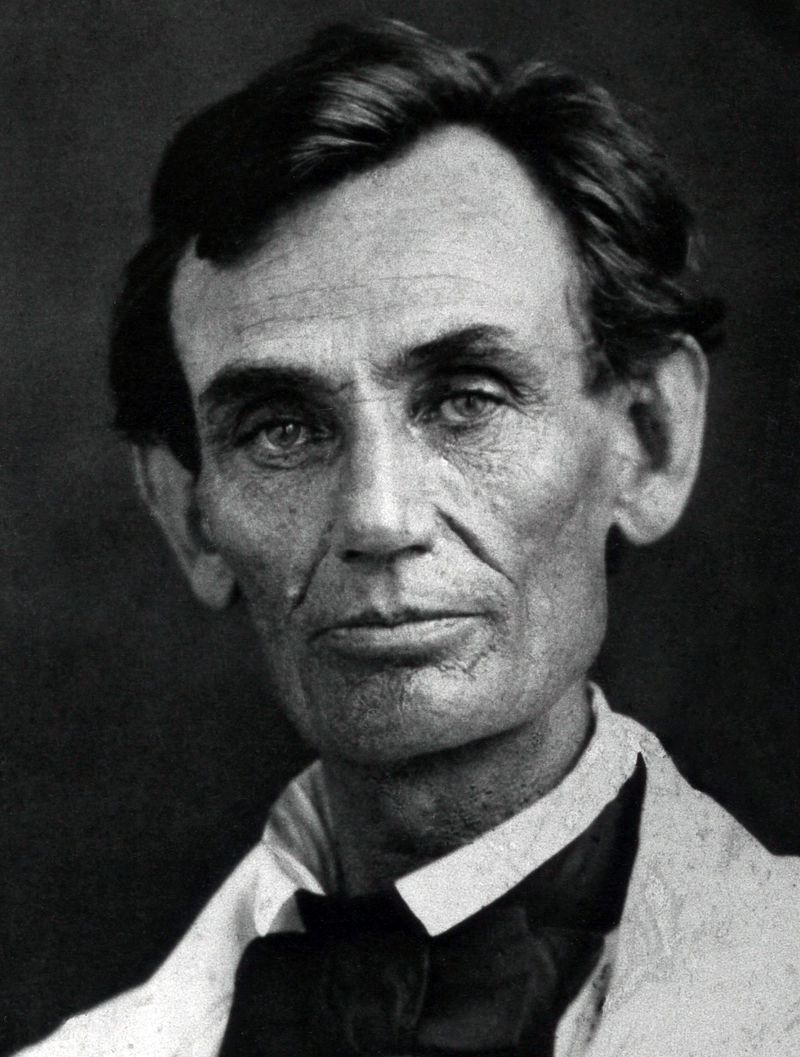
Abraham Lincoln
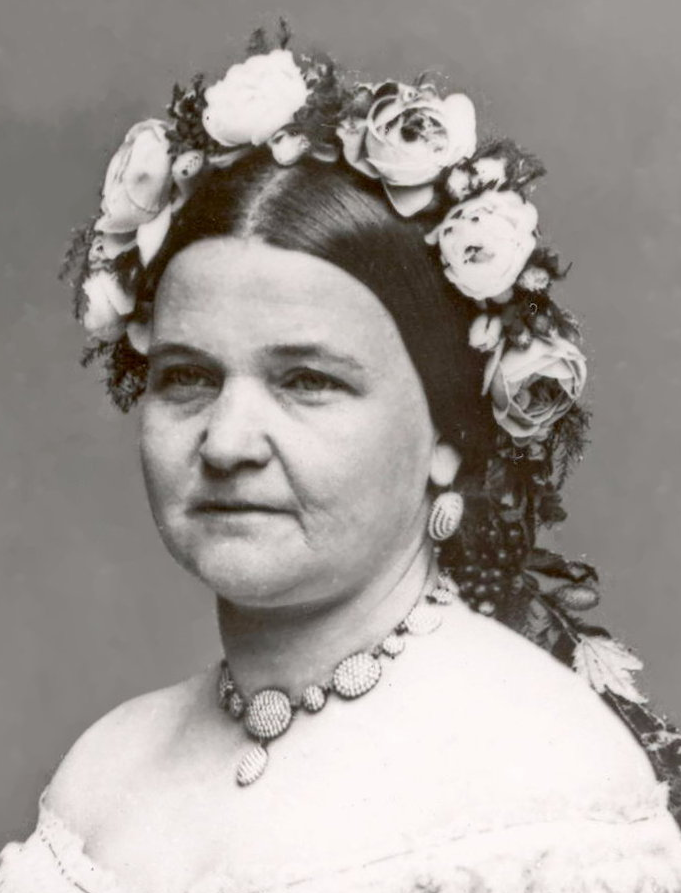
... and his wife, Mary Todd Lincoln
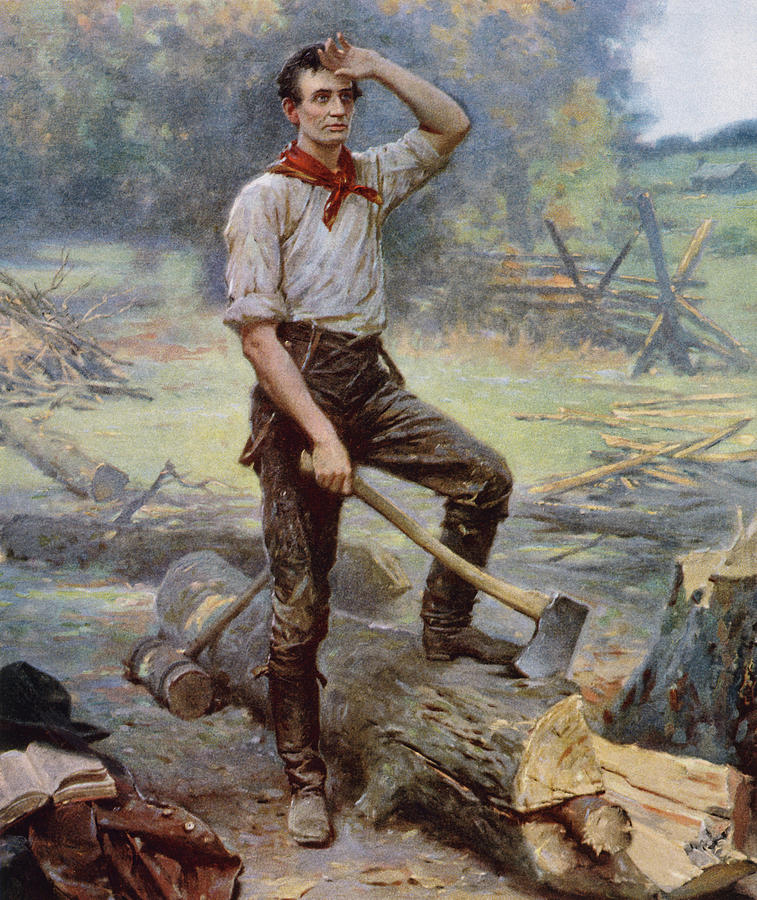
The Railsplitter by Jean Leon Gerome Ferris (1909)
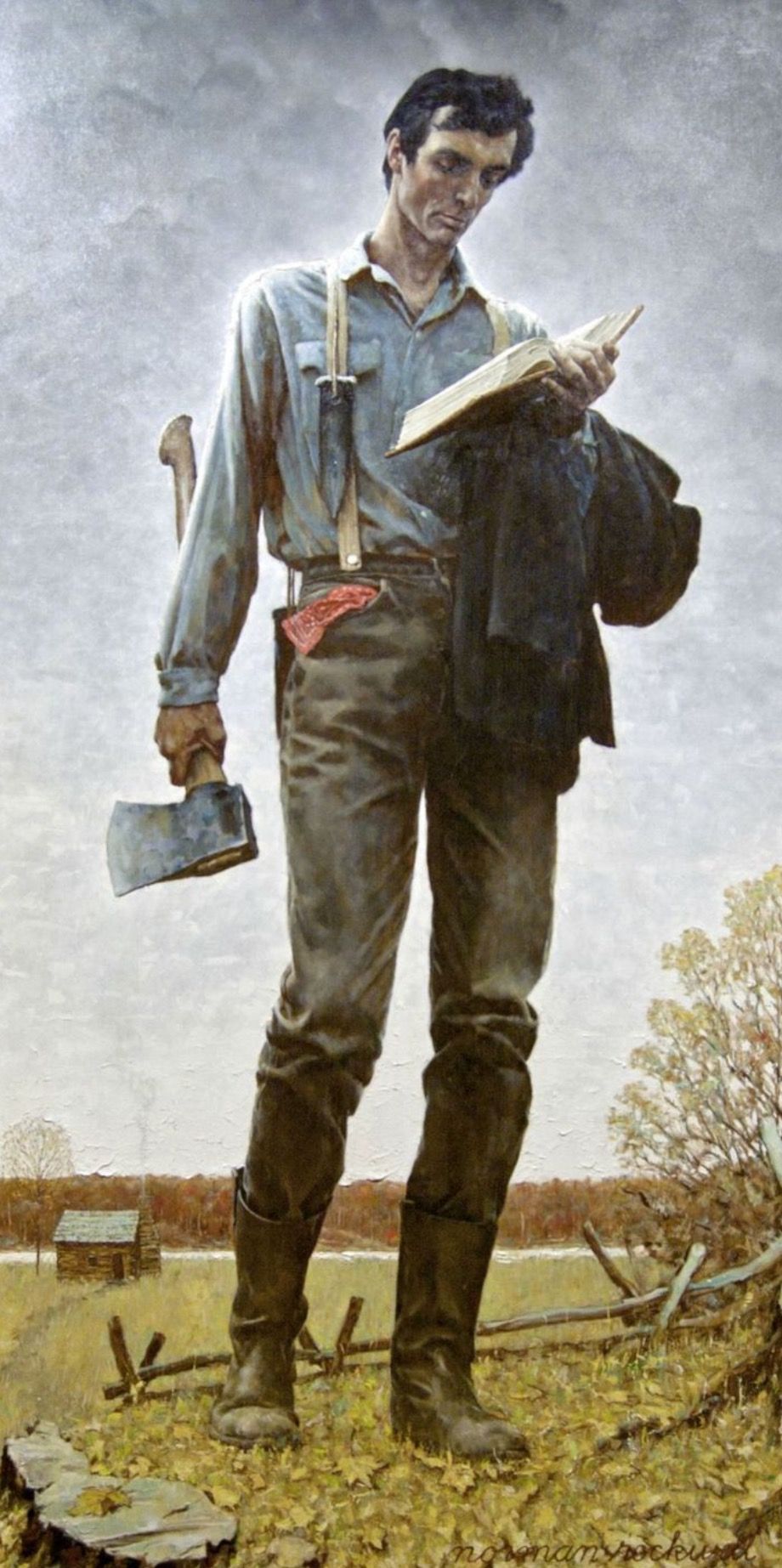
Young Lincoln – Norman Rockwell
|
The Lincoln-Douglas debates (August-October 1858)
In 1858 the Republicans nominated Lincoln as their
candidate for U.S. senator from Illinois, running against the
Democratic Party's candidate (and Democratic Party leader in Congress),
Stephen Douglas. The two men agreed to meet each other in various parts
of the state of Illinois for a series of seven debates. The nation
watched closely as the famous Douglas met this new challenger, a
seeming country boy with little to commend himself as he took on the
"Little Giant" Douglas. But it soon became apparent that this Lincoln
was no pushover. Douglas accused Lincoln of being simply another
Abolitionist (not yet very popular, even in the North) and Lincoln
accused Douglas of surrendering the original moral principles of the
Republic in his failure to take any kind of stand against slavery.
Thousands gathered, plus the national press, to hear Lincoln and
Douglas go at each other. In the end, the Illinois representation was
skewed by the way the state was districted and although the Republicans
gathered more votes than the Democrats, the Democrats received more
seats, and thus the Illinois Assembly re-elected Douglas to represent
the state in the U.S. Senate.
|
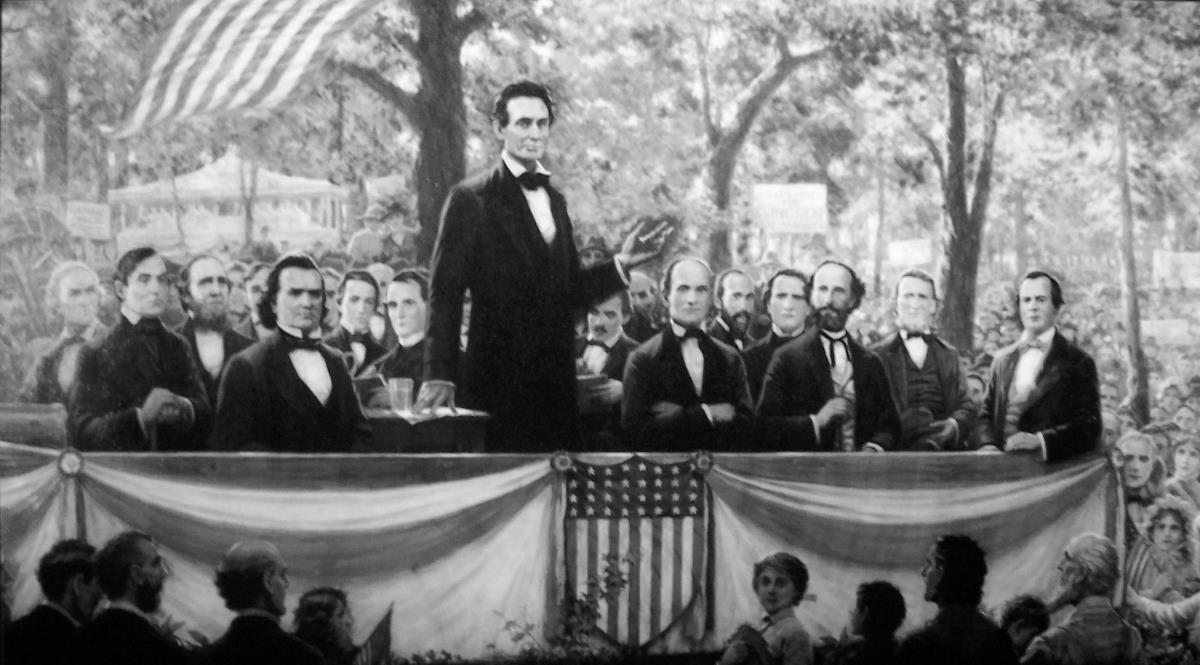 A Lincoln and Douglas debate
A Lincoln and Douglas debate
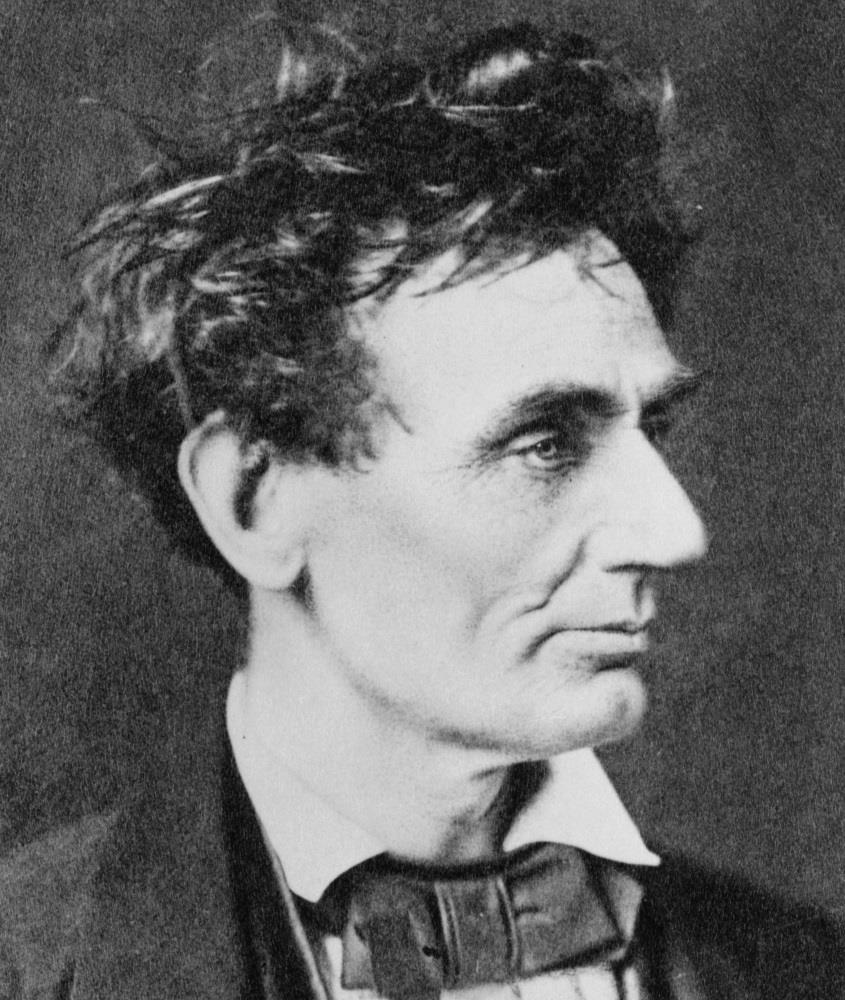
Abraham Lincoln
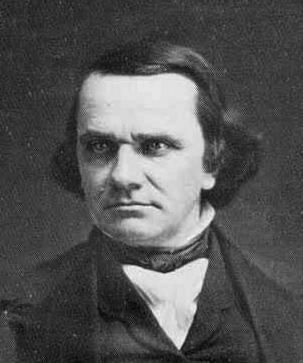
Stephen A. Douglas
|
The Cooper Union speech (February 1860)
But the Republicans did not forget the brilliant
way Lincoln put his arguments together, and in 1860 asked him to
address a group of Republican leaders at Cooper Union in New York City.
There he recalled the vision of the Republic's Founding Fathers and how
they struggled over the issue of slavery. He then answered point by
point the arguments of Southerners and of Northern Democrats as they
either defended or permitted slavery. And he addressed the threat
issued by the South that if a Republican were elected president, they
would secede. The Republican leaders were impressed.
|
|
Nomination as the Republican presidential candidate (May 1860)
In May the Illinois Republicans decided to get
behind Lincoln in a bid for nomination as the Republican Party's
presidential candidate. This would be for Lincoln an uphill battle
because William Seward and Salmon Chase were widely understood to be
the front runners for the nomination. But with a bit of help from his
Illinois friends, and much to the surprise of many, Lincoln was
nominated for the spot on the Republican National Convention's third
ballot. His well-reasoned moderation on the slavery issue and his
strong support for the old Whiggish agenda of protective tariffs and
internal infrastructure development had won him the day.
Meanwhile the Northern Democrats had nominated Douglas as their
presidential candidate – although the Southern Democrats withdrew from
the Democratic National Convention and nominated their own candidate,
John Breckinridge. Lincoln did not campaign directly, as did his
opponents. But the Republican Party did the campaigning for him,
running on his image as a simple American farm boy who, in the best
spirit of the Republic, made his way to success through hard work and
study. The tactic worked well.
On to the U.S. presidency
In November, with a huge turnout of voters,
Lincoln won a plurality of the popular vote, 1.87 million votes for
Lincoln, 1.38 million for Douglas, 850 thousand for Breckinridge and
589 thousand for a fourth candidate, John Bell – but an absolute
majority of the electoral vote, 180 votes to his opponents combined
total of 123 votes. Lincoln was thus elected to be the nation's
sixteenth president.
|
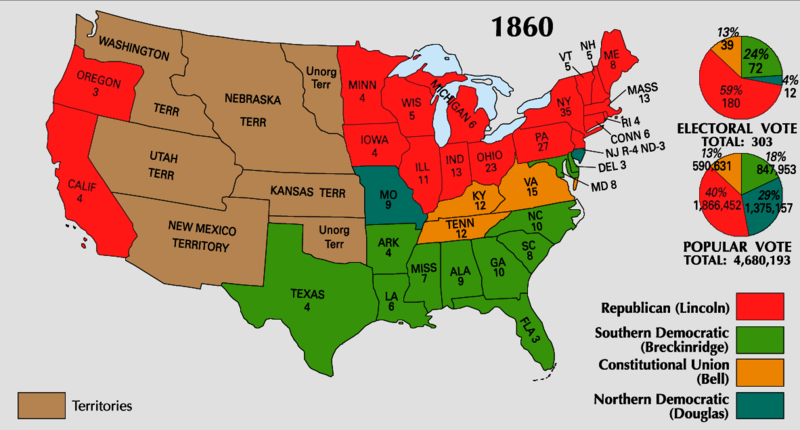
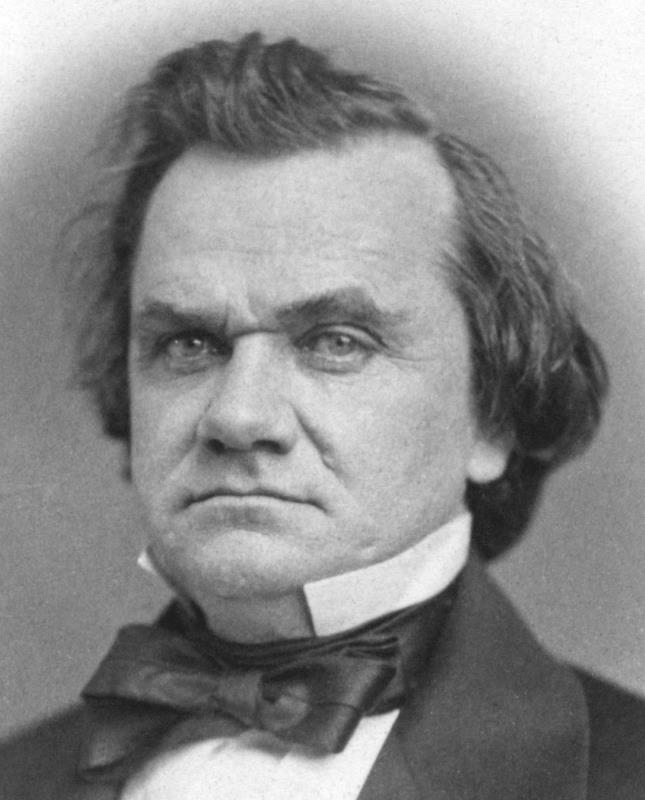
Sen. Stephen A.
Douglas
Presidential candidate
for Northern Democrats – 1860
U.S. Senator from Illinois
(1847-1861)
Library of Congress
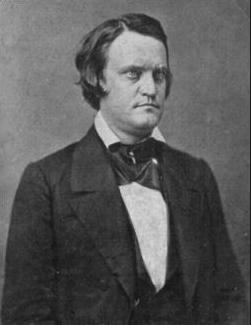
John C. Breckinridge
Presidential candidate
for Southern Democrats – 1860
US Vice President -
1857-1861
General in the Confederate
Army
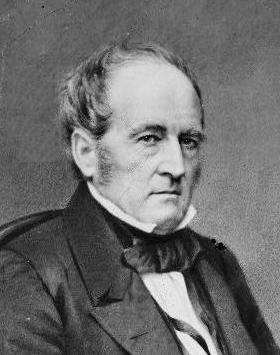
John Bell
Presidential candidate
for United States Constitutional Union Party (Whig remnant) – 1860
US Senator from Tennessee
- 1847-1859
U.S. Representative
- 1827-1841
|
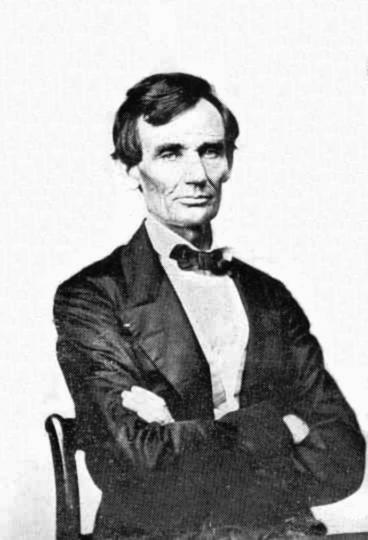 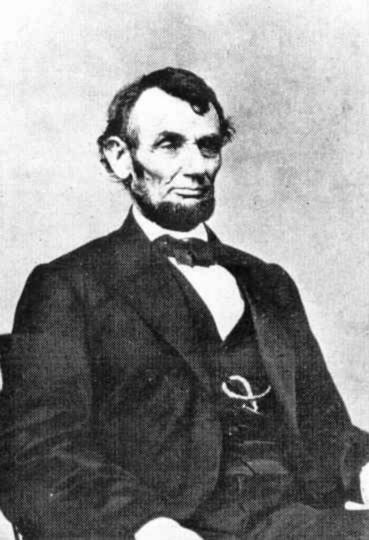
Abraham Lincoln – before
and after beard
Library of Congress (left)
/ National Archives (right)
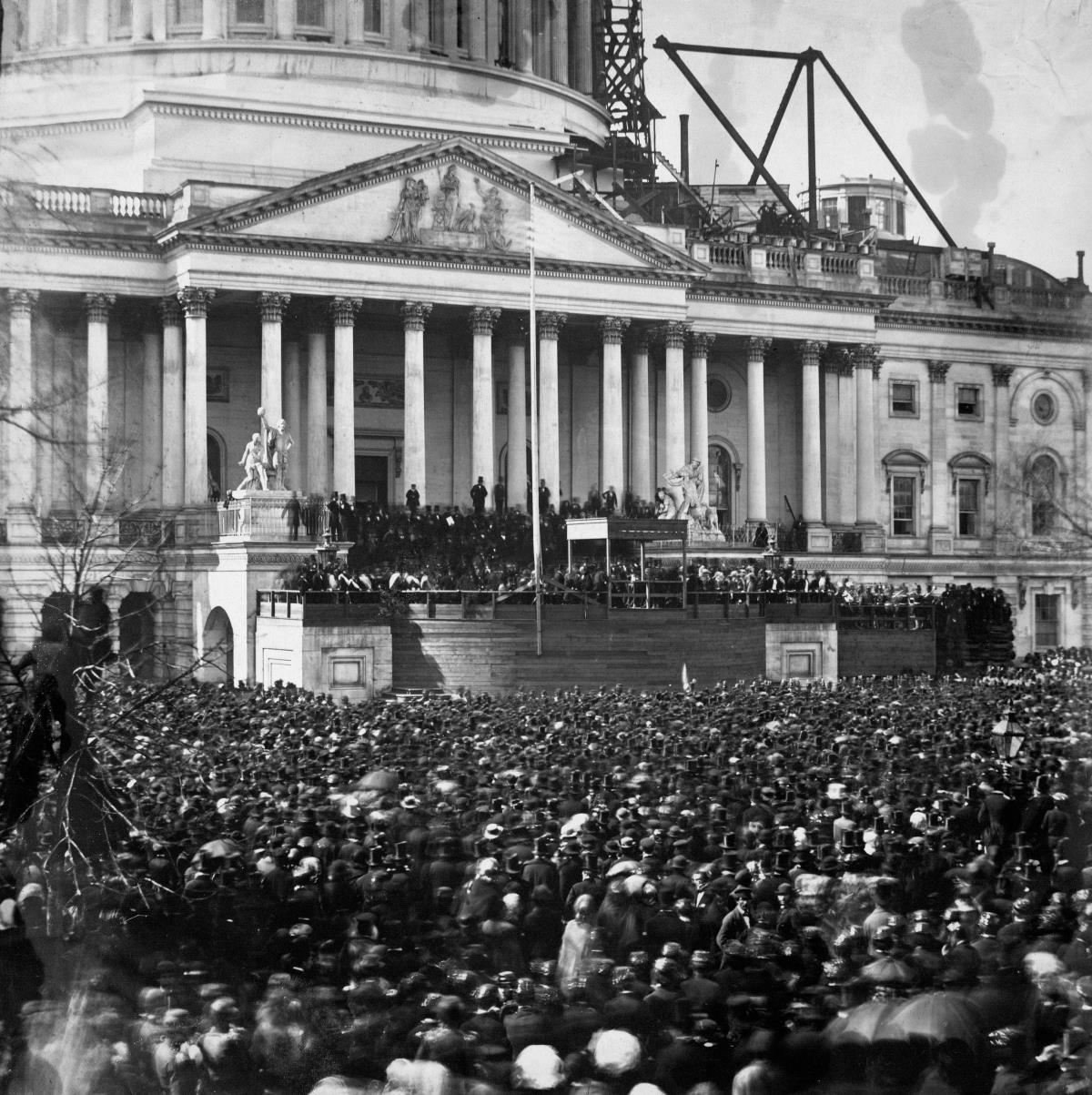
Abraham Lincoln Inauguration
- March 4, 1861
|
Lincoln then took the somewhat unprecedented step
of appointing to his cabinet a number of his major political rivals,
William Seward, Salmon Chase, and Edward Bates, among others. At first
these political dignitaries tended to be contemptuous of him2
and his country boy ways. But gradually they all (except Chase) came to
see Lincoln's true political genius and came to full support of him as
their president. Chase was retained in Lincoln's cabinet despite his
behind-the-scenes maneuvering to have himself replace Lincoln as
Republican candidate in the elections coming up in 1864, because
Lincoln respected Chase's financial skills. Lincoln eventually (1864)
appointed him as chief justice of the Supreme Court, removing a
constant irritant on his cabinet, but giving the country a chief
justice guaranteed to stand in support of the rise to citizenship of
America's freed slaves. As for Seward, he soon became a totally-devoted
supporter of Lincoln's, very important to the president during the dark
days ahead.
1Team
of Rivals is the title of a Simon & Schuster 2005 Pulitzer
Prize-winning book by Doris Kearns Goodwin, in which she demonstrated
the political genius of Lincoln in appointing to his cabinet a number
of his recent political opponents.
2Seward
even at first proposed to Lincoln to have him turn all real powers of
the presidency over to himself, and then proposed a bizarre foreign
policy to isolate the South, all of which Lincoln politely ignored as
he moved steadily ahead with his own policies for dealing with the
rising crisis.
|
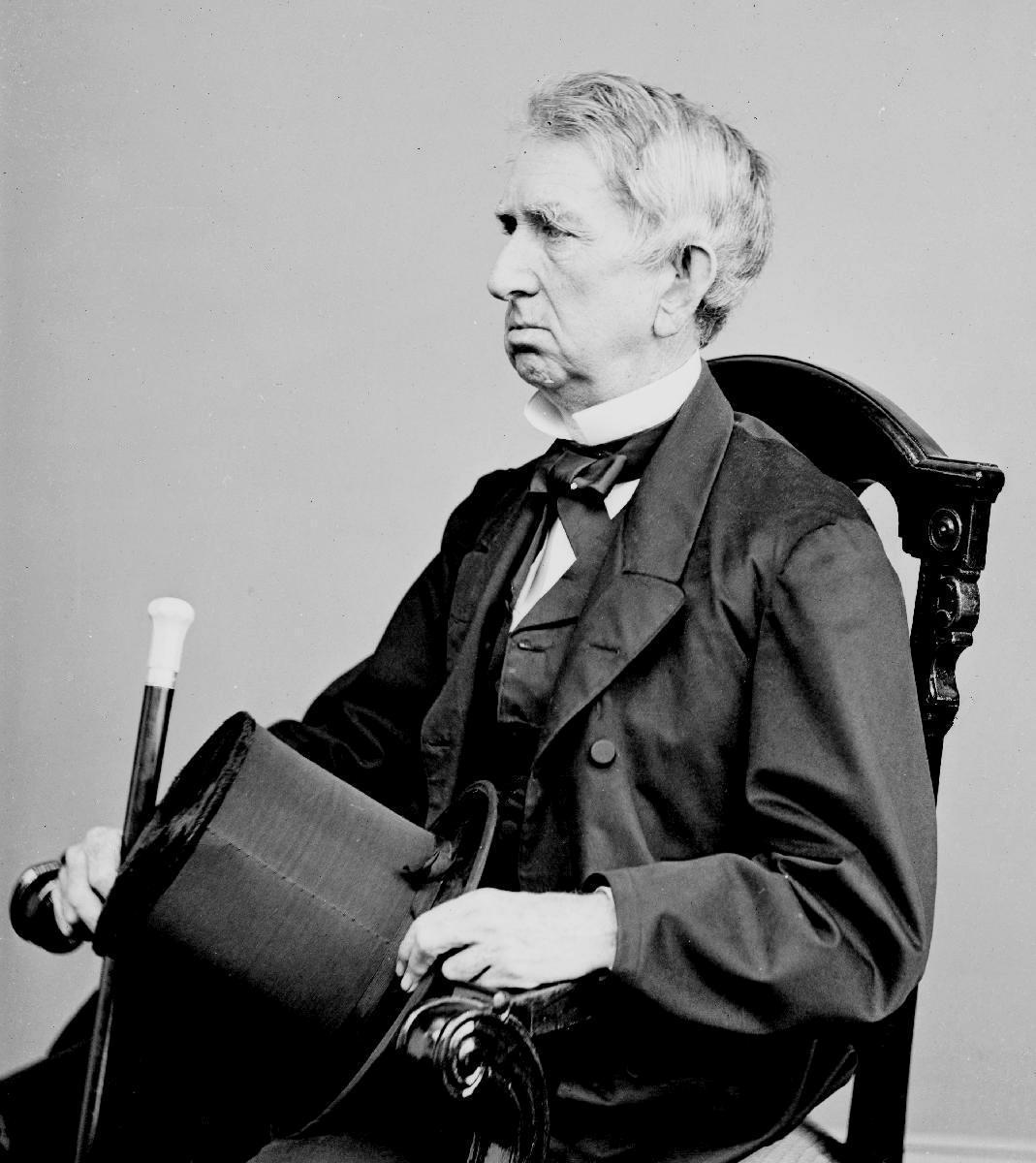
William H. Seward – photo by Mathew Brady
Secretary of State of the
United States (1861-1869)
Governor of New York
(1839-1842)
United States Senator from
New York (1849-1861)
Library of Congress
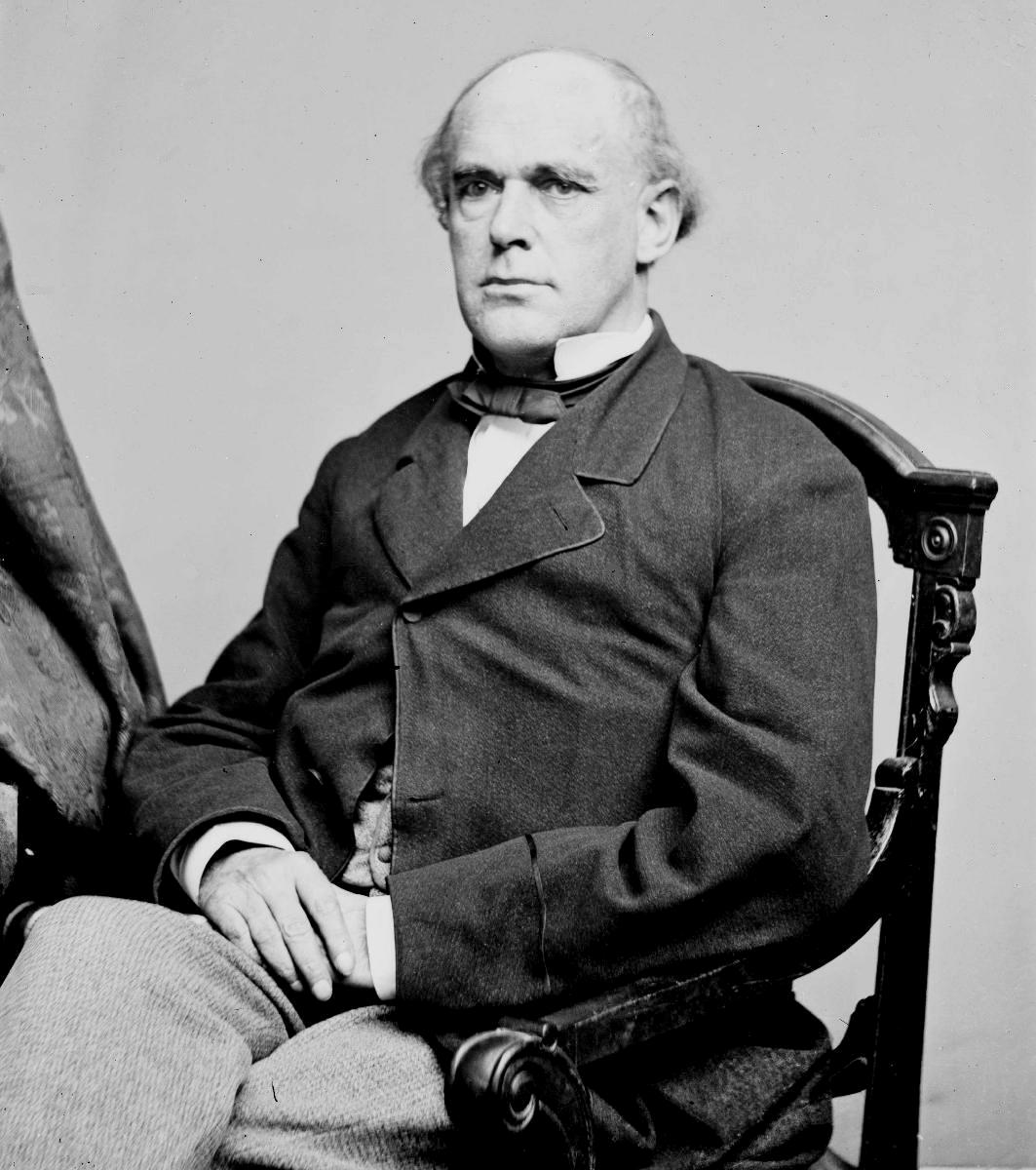
Salmon Portland
Chase
United States Secretary
of the Treasury (1861-1864)
United States Senator from
Ohio (1849-1855)
Governor of Ohio
(1856-1860)
6th Chief Justice of the
United States (1864-1873)
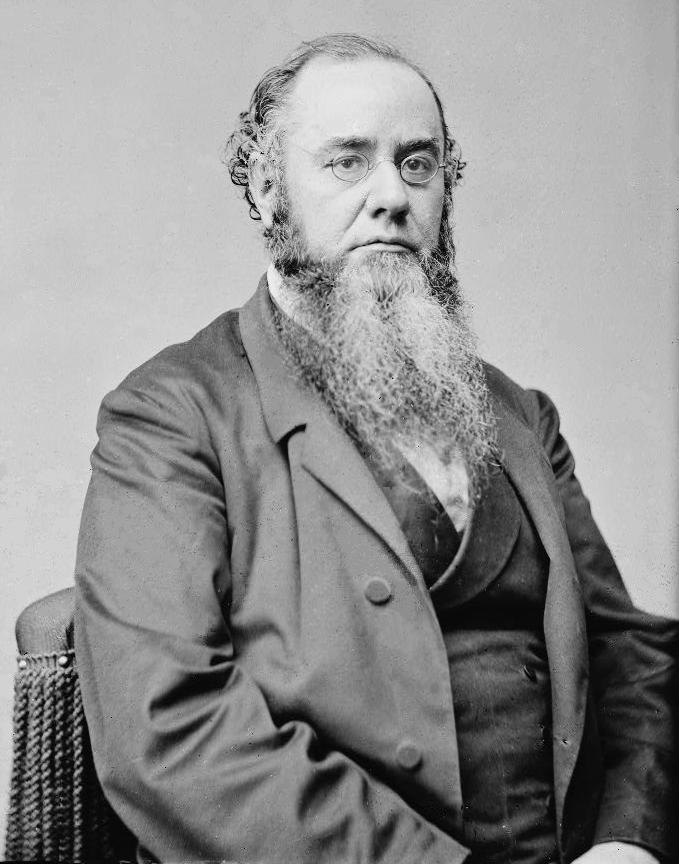
Edwin McMasters
Stanton
United States Secretary
of War (1862-1868)
United States Attorney General
(1860-1861)
Library of Congress
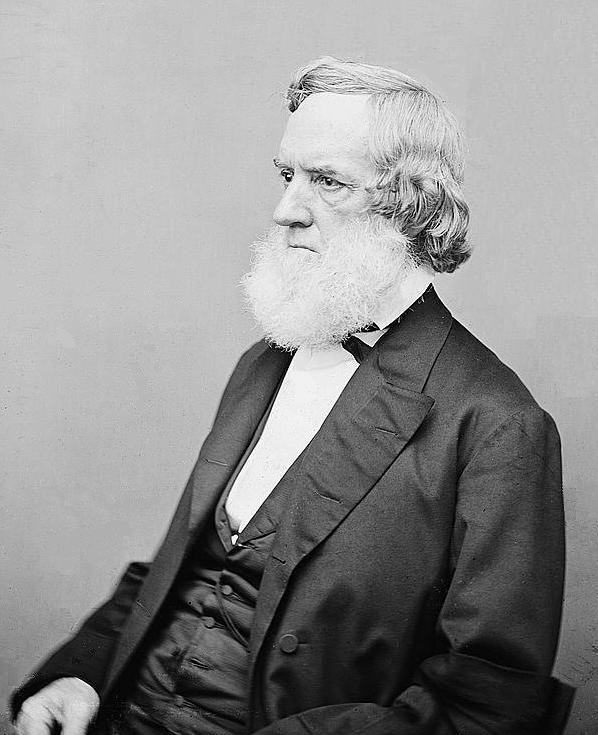
Gideon Welles
United States Secretary
of the Navy (1861-1869)
Library of Congress
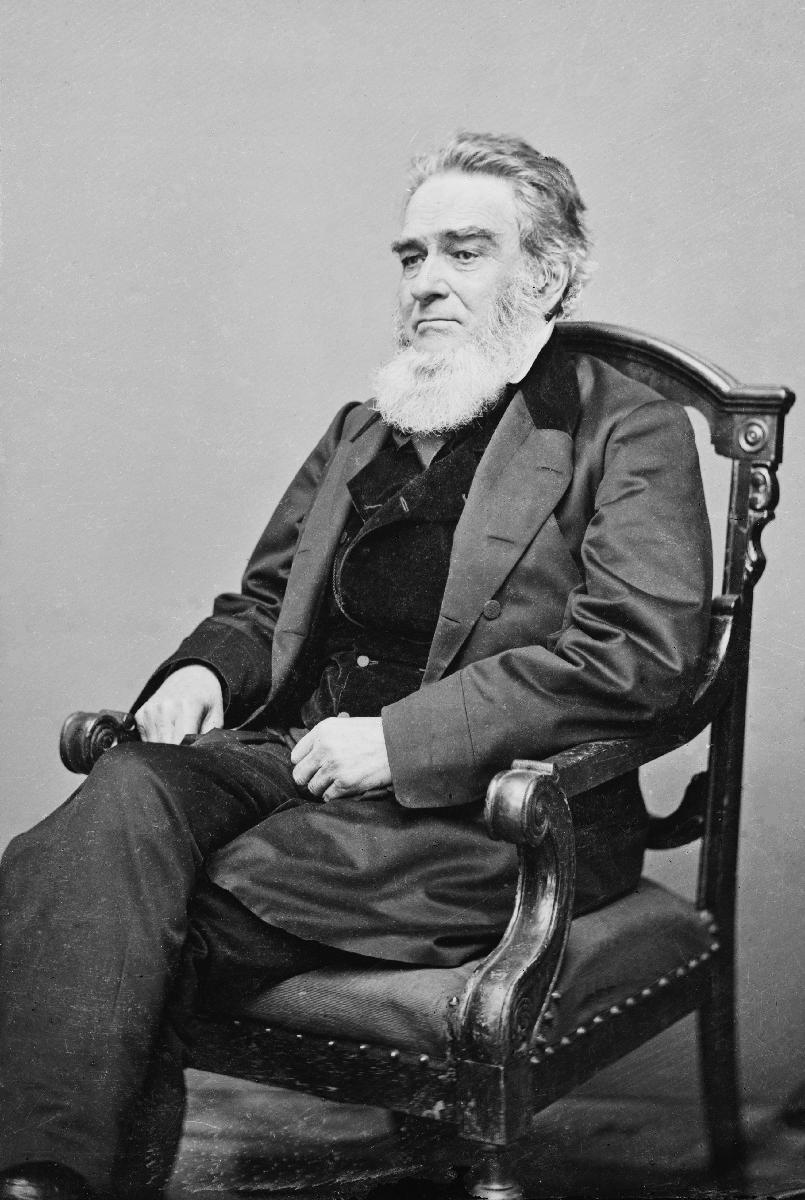
Edward Bates
US Attorney General
(1861-1864)
Library of Congress
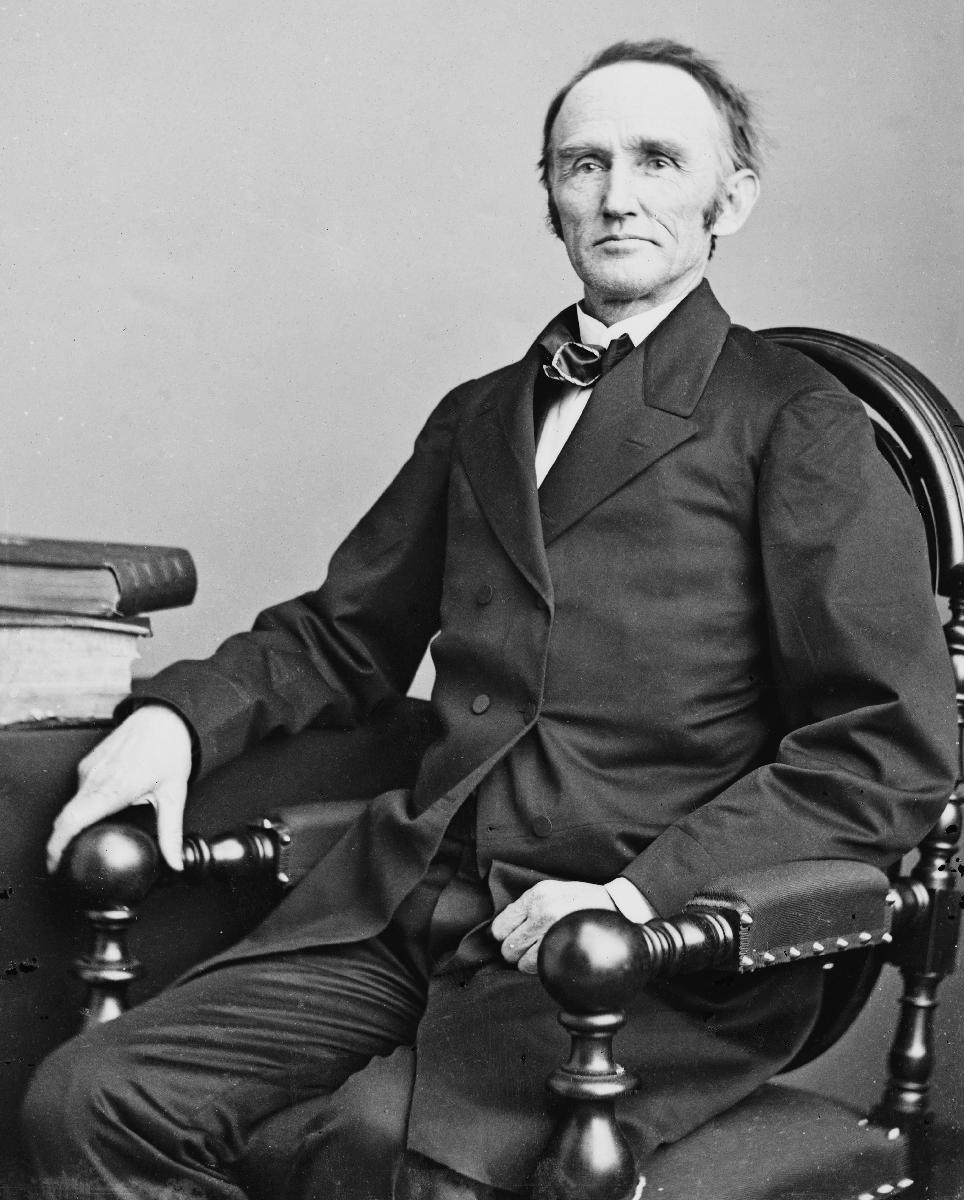
Montgomery Blair
United States Postmaster
General (1861-1864)
Library of Congress
|
Lincoln had only very limited war experience and
no formal military training, in contrast to his chief adversary,
Jefferson Davis, Confederate president and graduate of West Point and a
commanding officer (colonel) in the Mexican-American War.3
But Lincoln had a keen mind for strategy, a deep insight into the
character of others, and an awareness that he needed wise war counsel –
which he got from the elderly Winfield Scott4
and eventually from his war cabinet. Being a lawyer, he tended to think
through objectives better than the military men under him, who tended
to think mostly in terms of battle strategies designed to win battles.
Lincoln however thought in terms of war strategies (economics,
diplomacy, ideology, morale, as well as military engagements) designed
to win a war.
There seems to have been nothing
particularly remarkable about Lincoln's religious or spiritual nature
going into the White House in 1861. As president he would attend
frequently the New York Avenue Presbyterian Church in Washington. But
he was definitely not what you would call a churchy individual.
However, the four years of the presidency would have a tremendous
impact on how he made his way forward through life's many challenges.
He was a sensitive man, which made him all the more vulnerable to the
criticism and personal attacks that others would aim at him. He was
called on to lead a war, which meant the deaths of countless young men,
both Southern as well as Northern Americans, all of which burdened his
heart deeply. There would always be political voices claiming that he
was going too slow – or too fast – in his conduct of the war. There
would be subordinates who would disappoint him deeply with their
failures to live up to their responsibilities, others who because of
their own political ambitions would undercut him in order to bring him
down. Even within his cabinet – even within his own home (his wife
could be brutal in her sarcasm and withering criticism) – he often had
to face dispiriting opposition.
What held Lincoln together was not man,
not man's opinions, not man's advice. What kept Lincoln going during
these extremely stressful years was his growing sense of the hand of
God in placing him in the presidency, and the grace of God in providing
the only counsel he could depend on.
He had an ever-deepening sense that all
of this tragedy was a way that God was cleansing the nation of its
sins, in order to restore it to its longstanding status as a model
society, a true Christian nation and thus a greatly needed democratic
light to the world. As he put the matter at Gettysburg in November of
1863 in honoring those who had died for this just cause: Americans must
"resolve ... that this nation, under God, shall have a new birth of
freedom – and that government of the people, by the people, for the
people, shall not perish from the earth."
This attitude was brought into even higher relief in his second
inaugural address in March of 1865 (just weeks before his
assassination) when the entire second half of the speech focused on how
the nation must answer to the righteous judgments of God, and how it is
imperative at this point "with malice toward none, with charity for
all, with firmness in the right as God gives us to see the right, to
finish the work, to bind up the nation's wounds, to achieve a just and
lasting peace among ourselves and with all nations."
Here was truly a man of God.
3Davis
presumed himself to be militarily wise and thus failed to seek good
counsel. In fact he involved himself too deeply in the running of the
war at the field level, making things even more difficult for his
generals.
4Lincoln's Anaconda strategy, to surround and strangle the South into submission, was the brain-child of Scott.

Go on to the next section: The Nation Finally Divides
 Miles
H. Hodges Miles
H. Hodges
| |

 Lincoln's early years
Lincoln's early years








 Miles
H. Hodges
Miles
H. Hodges














